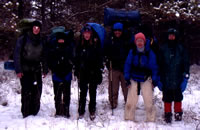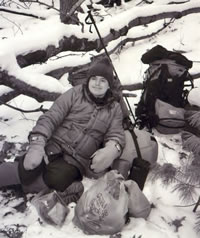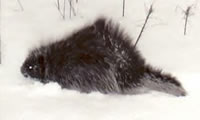|
The backpacking
trip covered Friday, Saturday, Sunday and Monday morning.
Those present were: Michael Neiger (Marquette, Michigan),
Aaron Cliff (Marquette, Michigan), Ed Pavwoski (Lansing, Michigan), Mary Powell (Flint, Michigan), Jenelle Smith (Fenton, Michigan),
Gail Staisil (Midland, Michigan), and Milton French (Detroit,
Michigan).
Mary Powell (Flint, Michigan), Jenelle Smith (Fenton, Michigan),
Gail Staisil (Midland, Michigan), and Milton French (Detroit,
Michigan).
The group
pauses along
the High Country Pathway.
(Photo by Mary Powell)
View Gail Staisil's
Photo
Album from this trip
Michael was the
trip leader. Mary and Gail were veterans of many trips. For
Ed and Aaron this was their third trip and it was the first
trip for Jenelle and Milton.
All of the group members arrived sometime
Thursday night or Friday morning at the designated meeting
place. We got up about 8:15 a.m. and started on the preliminaries.
First we each signed a waiver and paid the $10 trip fee.
Then Michael checked the packs of the new
people. First he went through Jenelle's pack and removed some
unnecessary items. Then he went through Milton's pack and
did the same.
After that we drove to the start area.
Mary and Milton stayed there while the rest drove to the destination
and left the rest of the vehicles there. When they returned
we got underway about 12:15 p.m.
After some time we climbed Rattlesnake
Hill and were greeted by a spectacular vista to the south,
west and north. From there we hiked through hardwood forest
to our lunch area in a sheltered valley.
We learned right away to immediately add
layers whenever there is a stop and  not
to wait until getting chilled. After lunch we continued onward
up and down hills for much of the afternoon. not
to wait until getting chilled. After lunch we continued onward
up and down hills for much of the afternoon.
Milton French
of Detroit, Michigan
shows the group how
to relax in snowy country
at the foot of the
Rattlesnake Hills.
(Photo by Gail Staisil)
View Gail Staisil's
Photo
Album from this trip
Jenelle was having problems with traction
since her boots did not have adequate tread on the bottom.
Michael found an ingenious method of tying a rope in knots
around the bottom of her boots to form a crampon.
We reached a clearing and someone spotted
a porcupine. It was not frightened by us and we were able
to get quite close.
We went into the woods about 100 meters
for our first night's camp. By then it was close to 5 p.m.
Michael, Mary and Aaron all used tarps strung up next to each
other.
Ed and Gail used tarps apart from the
main group. Jenelle used a tent and Milton used a tent fly.
Milton did not take into account the domed
nature of the fly so it was difficult to erect upright. Michael
helped Milton with his tent fly so that is didn't sag in middle.
After the night's sleeping accommodations
were complete for the night, a fire was built. This was welcome
since the temperature was about 15 degrees Fahrenheit.
Next the group turned their attention to
getting supper. In addition to heat, the fire was used for
cooking. Mary had brought some stew beef and shared some with
the others.
Storage is not a problem in the winter
so we were able to bring perishable food. She also cooked
a delicious dessert that she also shared.
After supper we sat around the fire and
talked. Around 9 p.m. we headed to our sleeping bags for the
night.
About 8 a.m. Saturday morning, we got up
and were pleasantly surprised by much warmer temperatures.
Aaron, Jenelle and Milton got their first
exposure to melting snow for water. It takes about 10 liters
of snow just to get 1 liter of water. We used the campfire
to melt the snow. Purification is not necessary for snow.
The fire imparted a strong smoke taste to the water.
Also there is debris in the snow which
if not filtered will be in the water. The bandanna is useful
for this task. The snow soaks up the water as it melts so
care is needed to avoid overheating the pot.
Melting snow took much time and we did
not get underway until 10 a.m. About 10 minutes after we started
we stopped to give everyone a chance to strip layers.
As the trip went on we learned what to
wear when starting for the day to minimize stops to add or
remove layers. About every hour we would stop and give everyone
time to eat and drink. As always at each stop we would immediately
add a warm layer.
We made it to Pug Lakes for lunch. There
was running water there so melting of snow was not necessary.
However, the water had to be purified.
This is done by bringing it to a boil or
using iodine. There is also a neutralizer that can be added
after the iodine has done its work to mostly remove the iodine
taste.
Milton was having significant pain with
his backpack since it was not properly fitted. Michael worked
for some time to adjust the pack and rearrange the load. With
those changes he was able to finish the trip which he would
not have been able to do otherwise.
After a welcome lunch we continued to our
second night's camping spot. It was a beautiful spot overlooking
Canada Creek to the west. We easily got all the water we needed
from the stream.
There was some light snow in the evening
but less than 3 centimeters accumulation. We had our usual
routine of a fire, supper and talking around the fire. We
turned in about 9 p.m. for the night.
Since we had made less progress that planned
we got up early Sunday morning. About 6:30 a.m., Ed started
whistling to arouse the group. This day we needed to cover
at least 12 kilometers.
We modified the route to use less trail
and more fire breaks and narrow jeep trails so we were able
to cover more ground. This morning there was a lot of wind
so the layers were welcome.
We found a nice sheltered area for lunch
near some pine trees. We continued on an old railroad bed
and passed the site of a now abandoned logging town named
McPhee.
Later in the afternoon we passed to the
east of a stream and found a flat area next to it where we
camped for the night.
Ed's GPS unit indicated the stream was
50 meters into the brush from our bivouac area. We found a
faint game trail and walked it to the stream to get water.
There was about 2 to 3 centimeters of ice
for which the group machete was used to chop through it to
get to the water. It was our first encounter with cutting
through ice to get water.
We followed our usual routine of setting
up camp, starting a fire, eating supper and then talking around
the fire.
Sunday night was our coldest of the trip
with the temperatures dropping to about 5 degrees Fahrenheit.
We wore some layers to bed for warmth depending on the sleeping
bag rating.
In the morning we got an early start again
for our final day. It was windy and cold but a beautiful sunny
day.
About 12:30 p.m. we arrived at an intersection
that was 1 kilometer from the vehicles. Jenelle and Milton
stayed there while the rest went and got the vehicles.
It was quite a strange feeling to be riding
in a heated vehicle after 4 days outdoors. From there we went
back to the start area to get the other vehicles.
We then went to Atlanta to get some lunch
at a restaurant. After a welcome lunch we each said our goodbyes
and went our separate ways.
Read
another journal...
|



 Mary Powell (Flint, Michigan), Jenelle Smith (Fenton, Michigan),
Gail Staisil (Midland, Michigan), and Milton French (Detroit,
Michigan).
Mary Powell (Flint, Michigan), Jenelle Smith (Fenton, Michigan),
Gail Staisil (Midland, Michigan), and Milton French (Detroit,
Michigan).  not
to wait until getting chilled. After lunch we continued onward
up and down hills for much of the afternoon.
not
to wait until getting chilled. After lunch we continued onward
up and down hills for much of the afternoon.